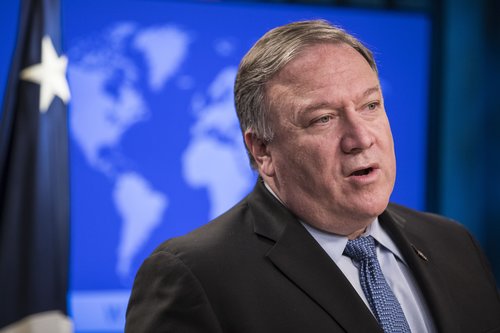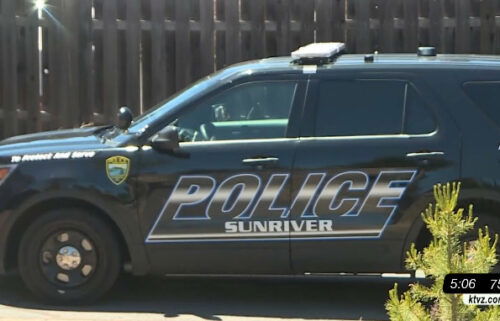Diplomats say they’re in a ‘strange parallel universe’ amid impeachment probe

As the State Department becomes engulfed by the House impeachment inquiry, diplomats say they find themselves caught in a “strange parallel universe,” where the administration officials they serve accuse them of being part of a “swamp” trying to take the President down.
Two State Department officials are set to testify on Wednesday — the latest witnesses from the embattled agency, where staff say they are proud of some of their colleagues who have already appeared, disappointed in others and increasingly frustrated by Secretary of State Mike Pompeo’s failure to defend them in the face of White House attacks.
Officials from the nation’s oldest Cabinet agency have been central to the inquiry into President Donald Trump’s alleged attempts to exchange aid to Ukraine for an investigation into his political foes. As the inquiry unfolds, the department itself and some individual officials have become the target of intensifying White House vitriol.
Political appointee Gordon Sondland, Trump’s ambassador to the European Union, offered a careful defense of the President that subsequent testimonies — including from highly respected, veteran foreign service officer, Bill Taylor — threw into deep question. In the aftermath, Taylor has been personally attacked by Trump and White House press secretary Stephanie Grisham, while Vice President Mike Pence dismissed the entire department for housing “an awful lot of the swamp.”
Within the State Department, in conversations with nearly a dozen staff, the word that repeatedly came to people’s lips as they described their colleagues wasn’t “swamp.”
Proud but scared
“They’re heroes,” said one foreign service officer posted overseas. “Absolutely heroes.” Given the political attacks, this officer added that “people are proud, but also scared.”
A Washington-based official said that “everyone is proud of what they’re doing, everyone knows that they’re likely taking a risk” and could face retaliation, “but they’re doing it, because they’re about the principle, the department, the country. Really, we’re so enormously proud.”
The State Department has been catapulted into a “strange parallel universe,” a second Washington-based official said, groping for a way to describe the way staff feel about the situation: The administration they serve is attacking them, career diplomats are having to hire lawyers simply for having done their jobs and anger is growing about the silence on the seventh floor, where the Secretary’s offices are housed.
Many diplomats invoked Pompeo’s history as a House lawmaker who drove the Benghazi hearings that looked into — and, they said, politicized — the death of the widely respected and admired US Ambassador to Libya, Chris Stephens.
Pompeo “could be doing more to defend the diplomats he allegedly leads,” said the second Washington-based official who has worked with Taylor and former US Ambassador to Ukraine Marie Yovanovitch. “There is a sense he’s hanging career diplomats out to dry. … To try to diminish these diplomats is a disgrace.”
“To my mind,” this official added, echoing several others with whom CNN spoke, “he’s demonstrating a lack of courage, a lack of integrity that will haunt him in his future political endeavors.”
The State Department did not respond to requests for comment about the criticism of Pompeo.
House lawmakers will hear Wednesday from mid-level foreign service officers Catherine Croft, a special adviser on Ukraine, and Christopher Anderson. Both worked under US Special Envoy for Ukraine Kurt Volker, who testified in early October.
House lawmakers have already heard from Yovanovitch, who Trump had removed from her post after a politically motivated smear campaign led by his personal lawyer Rudy Giuliani.
Croft is expected to tell the committee that while she was the National Security Council’s Ukraine director from December 2017 to July 2018, she repeatedly got calls from lobbyist Robert Livingston who told her that Yovanovitch should be fired. “He characterized Ambassador Yovanovitch as an ‘Obama holdover’ and associated with George Soros,” Croft is expected to say, according to prepared testimony. “It was not clear to me at the time — or not — at whose direction or at whose expense Mr. Livingston was seeking the removal of Ambassador Yovanovitch.”
Anderson is expected to say that former national security adviser John Bolton had “cautioned that Mr. Giuliani was a key voice with the President on Ukraine, which could be an obstacle to increased White House engagement,” according to prepared testimony. He will also tell lawmakers that there were some “vague discussions” on how to “address Mr. Giuliani’s continued calls for a corruption investigation.”
Lawmakers have already heard testimony from Philip Reeker, the acting assistant secretary of state in the Bureau of European and Eurasian Affairs, and the deputy assistant secretary, George Kent.
Next week, an old army friend of Pompeo’s, State Department Counselor Ulrich Brechbuhl, is slated to testify — though he has ignored a previous request to appear voluntarily. Foreign service officer Suriya Jayanti who was stationed in Kiev is also on the schedule.
‘It’s shocking’
State Department staff have distinguished, for the most part, between career officials and political appointees like Volker or Sondland.
Scott Anderson, a former diplomat who served as an attorney and adviser at the State Department, said that within the department there is shock and disappointment about Volker’s involvement in what appears to be a campaign to pressure Ukraine. Anderson’s observations echo conversations CNN had with State staffers who did not want to speak publicly.
“People are surprised he got roped into this,” Anderson said. “Volker is a respectable guy with an impressive resume… so it’s shocking the extent to which he got involved and seemed to be actively participating. He’s the one who comes off as the most disappointing here, because he should have known better.”
Career officials such as Kent are largely being given the benefit of the doubt. “I don’t think we have any reason to believe many of them knew the scope of what was happening,” Anderson said, characterizing department feeling.
Sondland also seems to be judged less harshly. The businessman and Trump donor is seen as a political person with “no institutional experience of where the strong lines are” and an incentive to please Trump, Anderson said, “so it’s not surprising that he’s the one with the most involvement…. But the degree to which his personal testimony is in direct contradiction to Taylor is shocking.”
Taylor told the inquiry that Sondland had told him that “everything” Ukrainian President Volodymyr Zelensky wanted, including US military aid, would be held up until he publicly committed to the investigations Trump demanded.
Trump has responded by blasting Taylor as a “Never Trumper,” while Grisham called him a “radical unelected bureaucrat.”
Diplomats vehemently rejected the notion that they operate politically, saying that the idea of partisanship is seen a third rail, both as a matter of principle and preservation. “It’s branded into the culture,” said Anderson. “People make it very clear they’re keeping domestic politics out of it — don’t give anyone an excuse to not promote me, not listen to me, not to take me seriously” or attack a department often targeted for funding cuts.
The attempt to politicize the department is one reason “the Stephanie Grisham statement is scary,” said the first official posted overseas. They continued, using State Department slang to refer to the secretary. “And S isn’t stepping up to protect us.”
‘Fixated’
In April — one year into his tenure as secretary of state — Pompeo unveiled a “professional ethos” for the State Department. Its last tenet: “I show unstinting respect in word and deed for my colleagues and all who serve alongside me.”
But the secretary has said nothing internally to defend Taylor or explain his failure to defend Yovanovitch, staff said. On Friday, Deputy Secretary of State John Sullivan told lawmakers that Pompeo had pushed back on the efforts to have Yovanovitch recalled.
“This had been a discussion that I’d had with the Secretary over a period of time and the Secretary had pushed back and sought justification from those who were criticizing Ambassador Yovanovitch,” Sullivan said during his Senate Foreign Relations Committee confirmation hearing to be ambassador to Russia. “After several months had elapsed, the secretary finally told me there had come a point that the President had lost confidence in the ambassador, and we needed to make a change in our mission to Ukraine.”
Publicly, Pompeo has offered only muted, general responses when asked about the diplomats under fire, pivoting instead to accuse journalists of being “fixated” on impeachment.
A day later, he offered something of an endorsement of Taylor. “I’ve watched Bill — he and I have talked about Ukrainian policy at some length,” Pompeo told Wichita State University’s student newspaper, “The Sunflower,” on Friday. “He and I both share this vision of how American interests in Ukraine can be properly represented, I have every reason to think that he’s still out there, banging away at that problem set,” Pompeo said.
Unhappiness was already simmering in the building about Pompeo. Staff point to his failure to fill positions, to the fact that he has allowed abusive managers, identified as such by the State Department Inspector General, to remain in their positions and to his wife’s constant but undefined presence on trips.
They repeatedly raise the secretary’s seeming use of his position to pursue personal political ambitions in Kansas, where he recently made his fourth trip this year, prompting one former official to quip that “we must be opening an embassy there.”
Many raised his history, saying it gave them little confidence he’d act to protect the department.
“Pompeo was the jackass in Benghazi raking people like my friends over the coals,” said the former official, who worked with Taylor and other officials who have testified. They spoke on condition of anonymity because they still deal with the State Department.
‘Some goodwill’
A second foreign service officer overseas said that Pompeo “had some goodwill when he came in because the bar was so low after (former Secretary of State Rex) Tillerson, but I think he’ll be seen as a disgrace, certainly within the building. People are very mindful that he built his career in part on politicizing the death of” Stephens.
This officer, like so many others, say the toughest thing to deal with is the Secretary’s refusal to defend them or his department, a silence that stands in stark contrast to the “swagger” Pompeo likes to say he has brought to the department. “I understand he has a line to walk, but he could say something,” the officer said.
Anderson, the former State lawyer, said “it’s very clear to people that Pompeo sees his first job as working with the President and that he is really less intent on … representing the views of people in his department.”
“It’s a source of power for him,” Anderson said, “but this has come at the expense of his reputation inside the State Department.”
The first Washington-based official described the situation as “surreal.”
“We have been under attack by our own President,” this official said, “and S has looked the other way.”
CORRECTION: This story has been updated to reflect that Catherine Croft is a foreign service officer.



